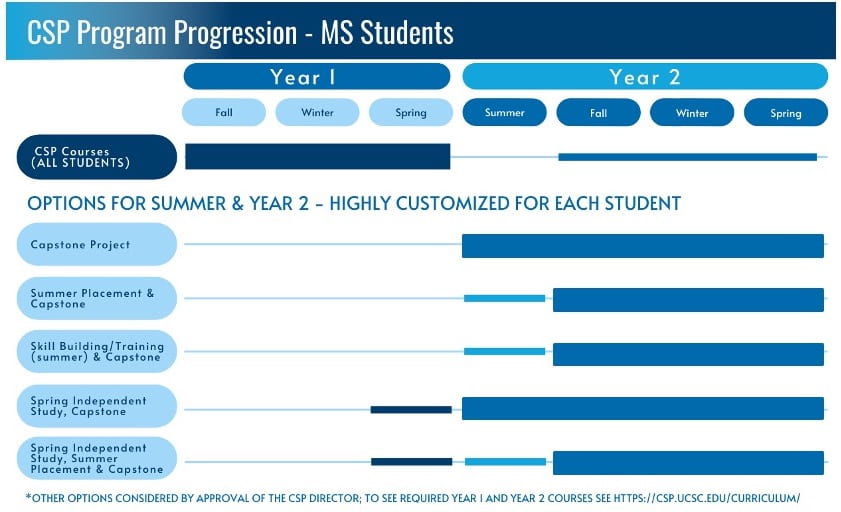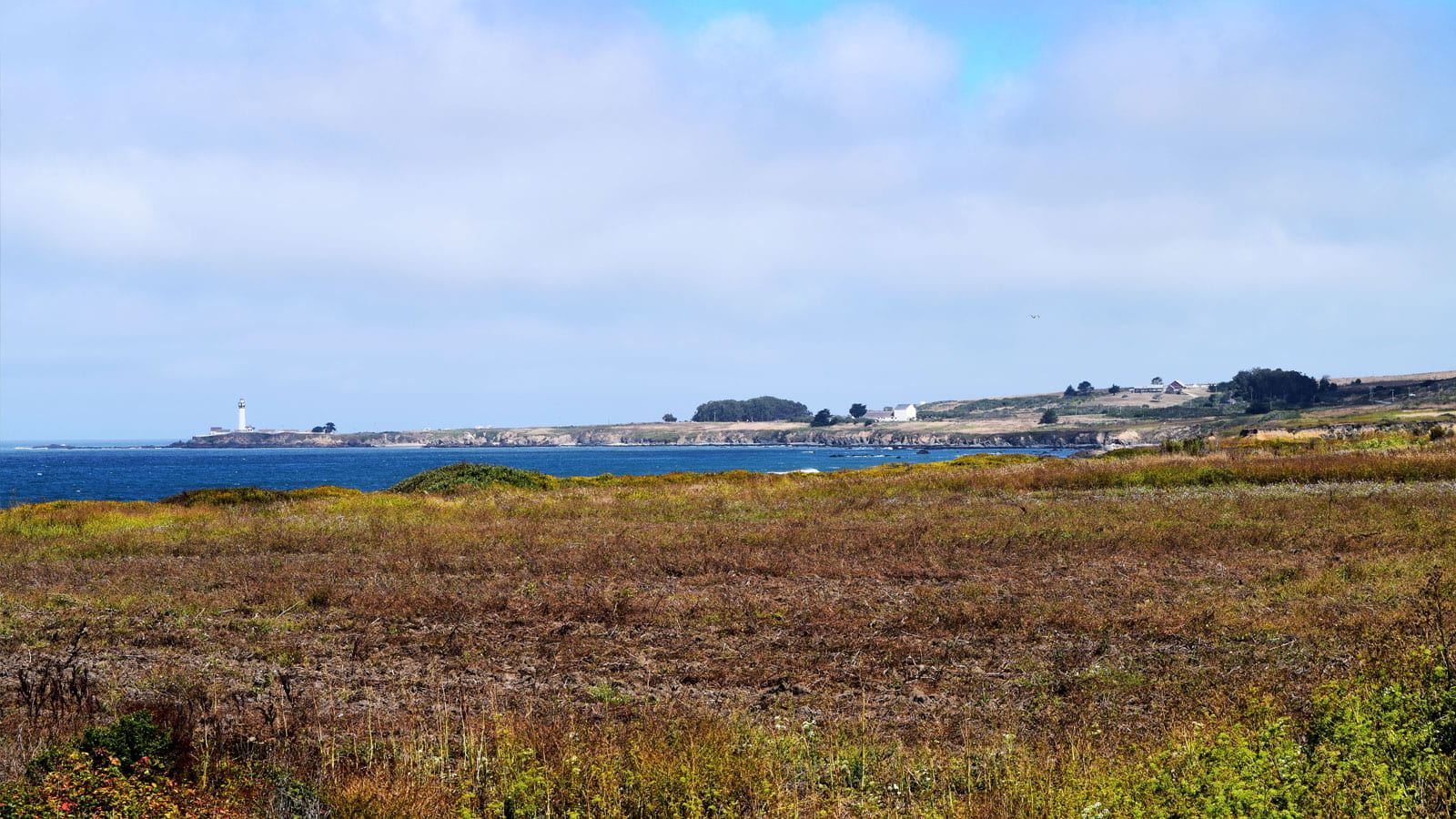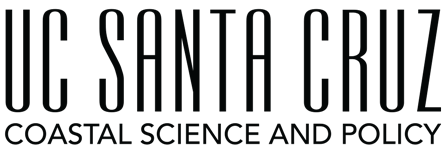CSP CURRICULUM
The CSP MS is a two year masters program.
Students follow the course plan below.
Fall |
Winter |
Spring |
|
|---|---|---|---|
1st Year |
|
|
|
2nd Year |
|
|
|
Highly Tailored Approach to Your Education
Customize your education to suite your career goals!
See examples of Capstone Projects here.

YEAR 1 & 2 CURRICULUM
Fall Quarter Year 1:
Coastal Natural Science (CSP 200)
This course is designed to provide students with a foundation in the fundamentals of the natural sciences, including key physical and chemical environmental processes, key biological processes, biogeography, population and ecosystem ecology. It will also examine these processes’ relevance to sustainability sciences while drawing on examples from, and introducing students to, the diversity of coastal ecosystems around the world.
Faculty: Mark Carr
Coastal Social Science (CSP 210)
This course is designed to provide students with a basic foundation in in the social sciences, through a systematic study of social groups ranging in size from small to social institutions to entire societies. Student will gain a basic understanding of sociological theory, organized around the themes of social interactions and relationships, social inequality, and social change. It will also examine the relevance of these relationships and institutions to sustainability issues while drawing on examples from, and introducing students to, issues representative of the coastal zone.
Lecturer: Elena Finkbeiner
Coastal Economics (CSP 220)
This course investigates the role of human behavior and government policy in coastal economies. We will explore the tools necessary to estimate the costs and benefits of environmental regulations and to evaluate a series of current policy questions regarding air and water pollution, the costs of climate change in the US and abroad, and the tradeoffs between various possible approaches to addressing coastal environmental concerns. The focus is on both conceptual thinking and quantitative evaluation of environmental issues and policies. Students should learn the basic tools and methods of economic analysis, combine these tools with students’ training in natural and behavioral sciences, and apply these skills to explore and evaluate topics and policies particular to coastal sustainability.
Faculty: Jeremy West
Integrated Problem-Based Discussion (CSP 230)
This discussion section uses a series of case studies to demonstrate means and values of integrating across the natural and social sciences and economics disciplines in developing solutions to coastal sustainability.
Faculty: Mark Carr, Jeremy West, and Elena Finkbeiner
Year 1 Capstone Planning & Design Fall (CSP 231A)
Students learn and apply methods for designing scalable solutions to complex problems, focusing on sustainability challenges and opportunities in coastal areas. Sessions primarily involve peer-review and feedback on student progress in planning their individual Coastal Science and Policy (CSP) capstone project. The capstone project must engage with a real-world partner(s) on a scalable opportunity for solving a critical problem in coastal areas (from land to sea). Faculty lead mini-lectures as needed. Course stresses learning-by-doing: weekly assignments have students work outside of class on steps or skills in the design process and then the student shares their work in the following class to gain peer insights.
Faculty: Anne Kapuscinski
Facilitating Change: Leadership and Communication (CSP 245)
Offered as a 1 week intensive
A skills-based course in effective leadership and communication, including stakeholder engagement, facilitation, conflict resolution, team building, and introduction to project management. Communication training includes identifying audiences and objectives (public, philanthropy, policymakers, managers, scientist practitioners) and leveraging non-traditional communication platforms.
Faculty:Kristy Kroeker
Winter Quarter Year 1:
Policy Analysis (CSP 242)
This course will introduce students to basic methods of applied policy analysis, drawing mostly on public policy and planning. Students will apply their analytic methods to real-world questions and decision-making arising in the coastal context. Policy analysis will be broken down into various steps, including problem definition, evidence-building, selection of alternatives, decision-making criteria and policy evaluation tools.
Faculty: Mijin Cha
Coastal Governance (CSP 243)
This course is designed to equip students with major theories of ocean and coastal governance, with particular emphasis on those that underlie current policy and management approaches. Students will engage with and analyze local, state, national, and international laws and policies, considering interactions across scales, levels of social organization, and institutions. Students will gain critical skills in assessing the underlying assumptions of particular governance approaches, and weighing strengths and weaknesses of particular coastal contexts and challenges.
Faculty: Katherine Seto
CSP Year 1 Capstone Planning & Design Winter (CSP 231B)
Picks up where the fall capstone planning seminar ended. Students continue designing capstone project for pursuing a scalable solution to a complex and pressing coastal sustainability problem. Winter focus is learning and applying strategies and methods to: (a) co-create a capstone project with a non-academic partner in the government, non-governmental or private sector; and (b) develop and submit successful funding proposals for the project. Methods learned apply broadly to collaborative, solutions-oriented work that may be pursued after graduation.
Faculty: Anne Kapuscinski
5 unit Elective or Methods Course (see below for more details)
Spring Quarter Year 1:
Adaptation and Planning (CSP 244)
Time To Be Announced
This course will build upon the interdisciplinary and skills-based coursework of the preceding two quarters. It will provide students with an opportunity to perform an integrated assessment of a sustainability challenge related to a coastal issue. Students will work as small teams to assess the social-ecological dimensions for a variety of adaptation strategies. This is meant to be a capstone course that allows students to integrate coursework in an experiential, solutions-based course.
Faculty: Anne Kapuscinski
2 Additional Elective or Methods Course
At least 1 method course is required, if a student has not met this requirement in a prior quarter they must complete it in spring. Students can take multiple methods courses or complete an additional elective course. Method and Elective Course options can be found below.
Year 1 Elective and Methods Course Requirements
M.S. students are also required to take one five-unit methods course and one five-unit elective course in their first year. The methods and elective courses can be drawn from courses currently offered across the UCSC campus. The methods course should provide training in quantitative or qualitative research design, tools, and analysis, as well as broaden the student’s disciplinary knowledge. For example, incoming students with an undergraduate degree in the natural sciences (e.g., ecology) may be expected to take a graduate-level elective course in the social sciences (e.g., politics, economics).
The methods requirement can be met by taking CSP 241 (cross listed with BIOE 286), another course from the list of approved methods courses found here, or by approval of the program director. The selection of the methods and elective courses will be made in consultation with the student’s faculty adviser and program, with final approval from the program director.
CSP-specific Methods Course
Experimental Design and Statistics for Applied Sustainability Science (CSP 241)-Winter (5 units)
Focuses on problems and designs in environment monitoring, mitigation, ecology and population biology. Topics include basic experimental design; exploratory data analysis—from a graphical perspective; hands-on statistics; and graphical theory.
Faculty: Peter Raimondi & Roxanne Beltran
Quantitative Methods for Coastal Climate Resilience (CSP 282/CSP 182) Spring (5 units)
Focuses on quantitative methods and skills for coastal climate resilience, using data science, statistics, data visualization, and geospatial analysis. Prepares students through hands-on work and real-world case studies. The course uses lectures, python notebooks, and examples of coastal hazard risks and data analysis and representation. No previous programming or geospatial modeling experience is necessary.
Faculty: Borja Reguero
CSP-specific Electives (students can choose an elective outside of CSP):
Hacking4Oceans (CSP 281A)-Spring (5 units)
One-quarter graduate-level class in which multidisciplinary student teams of four address problem or challenges provided by real-world sponsors or identified by student groups. Teams learn how to apply the Lean Launchpad and Lean Startup methodologies to discover and validate customer needs and to continually build prototypes to test whether they understood the problem and solution. Weekly assignments involve working outside of class on steps or skills in the design process and then sharing it for peer-review in class. Involves reading and a substantial assignment each week before the next week’s session on that topic. Course is held concurrently with an undergraduate course. Graduate students are required to submit an additional culminating report such as a funding proposal to support next steps in their team’s solution, a critical analysis of the Lean Design Method, or a policy analysis regarding scalable adoption of the solution. Enrollment is by instructor consent. Application and interview in winter quarter for spring quarter course is required.
Faculty: Anne Kapuscinski
Fisheries Ecology (CSP 271)-Spring (2 units offered in odd calendar years)
Provides overview of current topics in fisheries ecology and fisheries management. Students learn about basic ecological concepts as they apply to fisheries management systems. Specific topics include: fisheries systems, alternative management controls, history of fisheries management, whether fisheries are sustainable, fisheries-induced evolution, fisheries bioeconomics, population structure and portfolio effects, and ecosystem-based fisheries management. The course aims to provide students with an overview of topics in fisheries ecology through a combination of lectures, current literature, and case studies. Students explore controversies and hot topics in fisheries science through discussion and review of relevant literature. Enrollment is by permission of the instructor. Enrollment is intended for juniors, seniors, and graduate students in the programs of Coastal Science and Policy, Environmental Studies, Ecology and Evolutionary Biology, Ocean Sciences, and Science Communication. There are no formal prerequisites, but undergraduate students are strongly encouraged to contact the instructor regarding prior coursework.
Faculty: Eric Palkovacs
Independent Study in Coastal Science and Policy (CSP 297)
Independent study and research under faculty supervision. The student, guided by a faculty member, pursues in-depth learning about a specific coastal science and policy problem, opportunity or solution. Students submit petition to CSP program and faculty member.
Faculty: Varies (By permission only)
Special Topics in Coastal Science and Policy (CSP 292-2 unit; CSP 293-5 unit)
Seminar in which students present, discuss, and gain feedback on a current special topic in the interdisciplinary arena of coastal science and policy. The special topic can involve identification of current problems, relevant research and practice, and/or design of solutions in coastal science and policy. Course offered intermittently.
Faculty: Varies (By permission only)
Capstone Year (Summer & Year 2):
Summer Placement
All students will be required to participate in an intensive summer placement or begin their year-long capstone project at the end of their first year. This summer placement will consist of placement in a practitioner agency, NGO, or industry to provide students with practical awareness in the conservation and sustainability science and policy fields (students will work with the program to explore potential practitioner partners for their placement and capstone). Students will receive first-hand immersion in the processes involved in implementing interdisciplinary knowledge and innovations as components of solutions to the complex challenge of domestic or international coastal sustainability.
Summer Placement work and projects will be required to include:
- A real concern of the institutional partner
- Research, solutions development, and implementation
- Strong interdisciplinary elements
A faculty advisor will oversee the summer placement. It is the intention that, in collaboration with institutional partners and CSP advisors, students’ capstone projects will emerge from this summer placement experience.
Capstone
After students complete the first year of the program, they either begin a summer placement or launch their capstone project with a practitioner partner. Students work with the practitioner, their capstone advisor and the program to develop their individual capstone project relevant to coastal sustainability as part of CSP 290 A, B, C. The capstone project is intended to be tailored for and address a direct need of an institutional practitioner partner organization. The project will be developed in collaboration with the practitioner partner, the student’s academic advisor, and the program. Aspects of the capstone will also be explored via the first year summer placement.
During this second year, students will also participate in a weekly seminar course (CSP 291) in person or remotely. The course is designed for students to share their progress and challenges with CSP faculty and their cohort. The course will also incorporate workshops for further professional development.
Capstone project results will be presented to the practitioner, program, and public during the Coastal Science and Policy Program Symposium at the conclusion of the second year (to watch past presentations and hear directly from our students click here). Students also submit a final written project report with their capstone deliverables to the program. Interim deliverables of student capstones may include a range of products such as databases, assessment write ups, white papers, blogs, project reports, or peer-reviewed academic paper submitted for publication. Final projects will be jointly evaluated by a committee comprised of the CSP Director and two two core or affiliated program faculty.
See examples of Capstone Projects here.
Workshops and Seminars:
Throughout the program, students gain additional knowledge and skills through a range of workshops, seminars, and brown bag discussions. To see a list of past and future speakers, please visit our events page.
Types of engagements our students participate in include:
- Seminars from UC Santa Cruz-based faculty and researchers including core and affiliate faculty and Institute of Marine Science Researchers (topics including coastal adaptation and resilience, nature-based solutions to sea-level rise, environmental justice and equity, and climate justice)
- Leadership training with Kevin Buck, Emergent Success Inc.
- Designing for Impact with Kevin Starr, Managing Director, Mulago Foundation
- Science Communication with Ben Landis, Founder, Creative Externalities
- Supporting real-world planning and adaptation with Tiffany Wise-West, Sustainability & Climate Action Manager for the City of Santa Cruz
- Seminars examples:
- Don’t let a Big Disaster Go to Waste: Lessons and Opportunities for Environmental Scientists with Dr. Kim Waddell, Director of the Virgin Islands Established Program to Stimulate Competitive Research (VI-EPSCoR) at the University of the Virgin Islands
- Applications of InVest with Dr. Becky Chaplin-Kramer, Natural Capital Project, and Dr. Heather Tallis, The Nature Conservancy
- Seminar on Foundation Engagement in the Marine Sector with Dr. Denny Takahashi-Kelso, Director of Marine Conservation, Gordon and Betty Moore Foundation
- Marine Plastic Pollution: Sources, Impacts, and Solutions with Dr. George Leonard, Chief Scientist, Ocean Conservancy
- Coastal Policy and Decision-making with John Laird
For questions about the program, contact CSP staff at csp@ucsc.edu.

